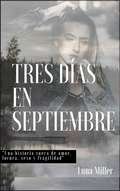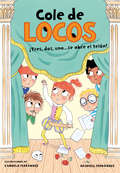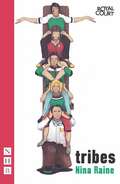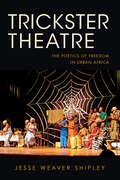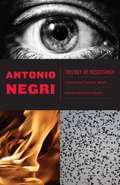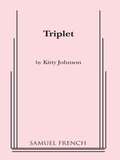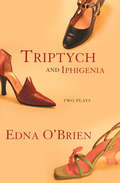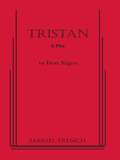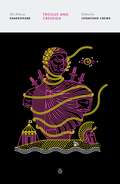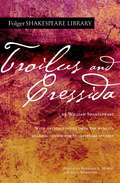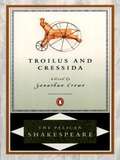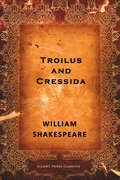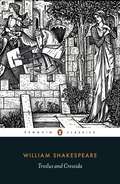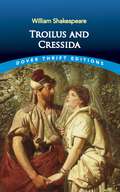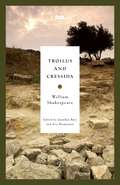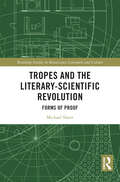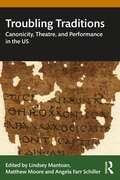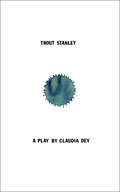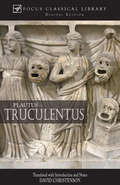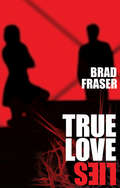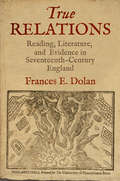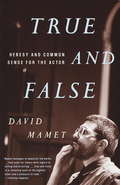- Table View
- List View
Tres días en Septiembre
by Luna Miller Daniel Martín del Campo M/O¿Has sentido alguna vez un anhelo desesperado por algo o por alguien? Quizás no siempre sabemos lo que deseamos, a pesar de que la sensación sea ensordecedoramente fuerte, así es como siente Gabriel, y como el artista joven, muy atractivo y demasiado inquieto que es, ignora ese sentimiento y se va a una aldea desierta en Ludvika para desarrollar una idea de trabajo. Bueno, nada resultará como lo piensa, de repente, él es una de las piezas de un juego donde cada movimiento parece tener consecuencias fatales, consecuencias que se ramifican en una ciudad aparentemente soñolienta. A una velocidad acelerada, Anna, Kessa, Lea, Johan y Niklas pronto enfrentarán su destino, es una novela que trata de la amistad, el amor y la aventura en ciernes, pero también de la manipulación, la infidelidad, la violencia y la muerte. Después de estos tres días en septiembre, no habrá vuelta atrás.
Tres, dos uno... ¡Se abre el telón! (Cole de locos #Volumen 6)
by Dashiell Fernández Pena¡Sexta aventura del cole más loco, una divertida serie de primeras lecturas sobre la escuela, la familia y los amigos! Preparar una obra de teatro no es nada fácil, y menos todavía cuando cada uno hace lo que quiere. Lucas ha modificado el guion incluyendo sus bromas habituales, Asim no consigue recordar su parte y las gemelas no logran actuar de forma creíble. La coordinación es un drama, pero Carlos (con la ayuda de su padre), se encargará de poner orden y conseguir hacer una buenísima actuación. ¡Que empiece la función!
Tribes
by Nina RaineIn Tribes, Billy, who is deaf, is the only one who actually listens in his idiosyncratic, fiercely argumentative bohemian family. But when he meets Sylvia, who is going deaf, he decides he finally wants to be heard. With excoriating dialogue and sharp, compassionate insights, Nina Raine crafts a penetrating play about belonging, family and the limitations of communication. Nominated for both the Olivier and Evening Standard Awards for Best Play, Tribes premiered at the Royal Court Theatre in London in 2011. Under the direction of David Cromer, the comic drama is currently receiving its North American premiere in New York City at Barrow Street Theatre through June 3, 2012.
Trickster Theatre: The Poetics of Freedom in Urban Africa (African Expressive Cultures)
by Jesse Weaver ShipleyTrickster Theatre traces the changing social significance of national theatre in Ghana from its rise as an idealistic state project from the time of independence to its reinvention in recent electronic, market-oriented genres. Jesse Weaver Shipley presents portraits of many key figures in Ghanaian theatre and examines how Akan trickster tales were adapted as the basis of a modern national theatre. This performance style tied Accra's evolving urban identity to rural origins and to Pan-African liberation politics. Contradictions emerge, however, when the ideal Ghanaian citizen is a mythic hustler who stands at the crossroads between personal desires and collective obligations. Shipley examines the interplay between on-stage action and off-stage events to show how trickster theatre shapes an evolving urban world.
Trilogy of Resistance
by Antonio NegriWith Trilogy of Resistance, the political philosopher Antonio Negri extends his intervention in contemporary politics and culture into a new medium: drama. The three plays collected for the first time in this volume dramatize the central concepts of the innovative and influential thought he has articulated in his best-selling books Empire and Multitude, coauthored with Michael Hardt. In the tradition of Bertolt Brecht and Heiner Müller, Negri&’s political dramas are designed to provoke debate around the fundamental questions they raise about resistance, violence, and tyranny. In Swarm, the protagonist searches for an effective mode of activism; with the help of a Greek-style chorus, she tries on different roles, from the suicide bomber and party apparatchik to the multitude. The Bent Man, set in fascist Italy, focuses on a woodcutter who resists fascism by bending himself in two and using his own now-twisted body as a weapon against war. In Cithaeron, perhaps the most audacious of the three plays, Negri reworks Euripides&’s Bacchae to explore the circumstances that would compel a diverse and creative community to withdraw from both the despotic government that constrains it and the traditional family relationships that reinforce that despotism.First published in France in 2009 and featuring an introduction by Negri, Trilogy of Resistance provides a direct and passionate distillation of Negri&’s concepts and offers insights into one of the most important projects in political philosophy currently under way, as well as a timely reminder of the power of theater to effectively dramatize complex and challenging ideas.
Triplet
by Kitty JohnsonComedy \ 3 f. \ Int. \ This insightful look at growing up female takes place on a wedding day. As the bride gets ready for the big event, she converses with herself as a 13-year-old princess and as a 21-year-old virgin. The "three" reveal various truths about themselves, their lives as they thought they would be and as they actually are. This is a wonderful play by a distinct and clever voice.
Triptych and Iphigenia: Two Plays (Books That Changed the World)
by Edna O'BrienTwo plays by the acclaimed Irish author: an adaption of Euripides and an “emotionally bruising drama” of three women obsessed with the same man (The New York Times).TriptychWith searing acuity, O’Brien presents the story of three women—a mistress, a wife, and a daughter—who are all helplessly drawn to Henry: their lover, husband, and father. While Henry himself never appears, his specter is never absent as these women confront the ways that love can simultaneously liberate and entrap. Triptych is a powerful work that explores sex, marriage, and predatory relationships.IphigeniaIn this modern take on the Greek tragedy, O’Brien takes creative license with Euripides’s tale of a daughter sacrificed for the sake of war. This taut, contemporary version presents, in O’Brien’s own words, “a more equal representation of the power and presence of both male and female characters” (Edna O’Brien, Independent, UK).“Intriguingly original . . . emotionally brave and engagingly clever.” –R. Hurwitt, The San Francisco Chronicle
Tristan
by Don NigroFull Length, Drama / 3 m, 3 f / Unit set. / A mysterious young girl appears at the aging Pendragon mansion in Armitage, Ohio one night in the midst of a storm and is rescued by Rhys. This young man is enchanted by the girl, but the servant girl Sara, who loves Rhys, resents her, and Rhys's parents are disturbed by her resemblance to a sorceress who was driven from the house long ago. Betrayal and family violence follow in this darkly powerful chapter in the author's series the Pendragon Plays
Troilus and Cressida
by William Shakespeare Stephen Orgel A. R. Braunmuller Jonathan CreweThe acclaimed Pelican Shakespeare series edited by A. R. Braunmuller and Stephen Orgel The legendary Pelican Shakespeare series features authoritative and meticulously researched texts paired with scholarship by renowned Shakespeareans. Each book includes an essay on the theatrical world of Shakespeare’s time, an introduction to the individual play, and a detailed note on the text used. Updated by general editors Stephen Orgel and A. R. Braunmuller, these easy-to-read editions incorporate over thirty years of Shakespeare scholarship undertaken since the original series, edited by Alfred Harbage, appeared between 1956 and 1967. With definitive texts and illuminating essays, the Pelican Shakespeare will remain a valued resource for students, teachers, and theater professionals for many years to come. For more than seventy years, Penguin has been the leading publisher of classic literature in the English-speaking world. With more than 1,700 titles, Penguin Classics represents a global bookshelf of the best works throughout history and across genres and disciplines. Readers trust the series to provide authoritative texts enhanced by introductions and notes by distinguished scholars and contemporary authors, as well as up-to-date translations by award-winning translators.
Troilus and Cressida
by William Shakespeare Paul Werstine Barbara MowatFor Troilus and Cressida, set during the Trojan War, Shakespeare turned to the Greek poet Homer, whose epic poems the Iliad and the Odyssey treat the war and its aftermath, and to Geoffrey Chaucer, author of The Canterbury Tales and the great romance of the war, Troilus and Criseyde. The authoritative edition of Troilus and Cressida from The Folger Shakespeare Library, the trusted and widely used Shakespeare series for students and general readers, includes: -Freshly edited text based on the best early printed version of the play -Full explanatory notes conveniently placed on pages facing the text of the play -Scene-by-scene plot summaries -A key to the play’s famous lines and phrases -An introduction to reading Shakespeare’s language -An essay by a leading Shakespeare scholar providing a modern perspective on the play -Fresh images from the Folger Shakespeare Library’s vast holdings of rare books -An annotated guide to further reading Essay by Jonathan Gil Harris The Folger Shakespeare Library in Washington, DC, is home to the world’s largest collection of Shakespeare’s printed works, and a magnet for Shakespeare scholars from around the globe. In addition to exhibitions open to the public throughout the year, the Folger offers a full calendar of performances and programs. For more information, visit Folger.edu.
Troilus and Cressida
by William Shakespeare Stephen Orgel"I feel that I have spent half my career with one or another Pelican Shakespeare in my back pocket. Convenience, however, is the least important aspect of the new Pelican Shakespeare series. Here is an elegant and clear text for either the study or the rehearsal room, notes where you need them and the distinguished scholarship of the general editors, Stephen Orgel and A. R. Braunmuller who understand that these are plays for performance as well as great texts for contemplation." (Patrick Stewart) The distinguished Pelican Shakespeare series, which has sold more than four million copies, is now completely revised and repackaged. Each volume features: * Authoritative, reliable texts * High quality introductions and notes * New, more readable trade trim size * An essay on the theatrical world of Shakespeare and essays on Shakespeare's life and the selection of texts
Troilus and Cressida
by William ShakespeareThe story of the Trojan War unfolds from the perspectives of Troilus and Cressida—a Trojan prince and his true love, one of whom is traded to the Greeks as part of a prisoner exchange.
Troilus and Cressida
by William ShakespeareIt is the seventh year of the Trojan War. The Greek army is camped outside Troy and Achilles - their military hero - refuses to fight. Inside the city Troilus, the Trojan King's son, falls in love with Cressida, whose father has defected to the Greek camp. In an exchange of prisoners the couple are split - they believe forever. The honour of lovers and soldiers is tested as a fierce battle begins and heroes must prove their worth.
Troilus and Cressida (Dover Thrift Editions: Plays)
by William ShakespeareA tragedy of jealousy and betrayal as well as a satire of the consequences of greed and lust, this drama unfolds amid the violent desperation of the Trojan War. After seven years of bloodshed, few illusions remain about the glory of war. The fate of two young lovers - Troilus, a Trojan prince, and Cressida, the fickle daughter of a traitorous priest - is intertwined with the exploits of Ulysses, Achilles, and other immortal figures of classical mythology.Based in part on Chaucer's Troilus and Criseyde, Shakespeare's work offers a darker and more cynical vision than its predecessor. Comic, tragic, and ironic by turns, the drama shifts between the intimacy of the central romance to the broader perspective of the armies' pointless skirmishes. Frequently regarded as the most modern of Shakespeare's dramas, the play debunks heroic ideals and delivers a powerful statement about the futility of war.
Troilus and Cressida (Modern Library Classics)
by William Shakespeare Jonathan Bate Eric RasmussenEminent Shakespearean scholars Jonathan Bate and Eric Rasmussen provide a fresh new edition of this classic tragedy of politics and war, honor and love--along with more than a hundred pages of exclusive features, including: * an original Introduction to Troilus and Cressida* incisive scene-by-scene synopsis and analysis with vital facts about the work* commentary on past and current productions based on interviews with leading directors, actors, and designers* photographs of key RSC productions* an overview of Shakespeare's theatrical career and chronology of his plays Ideal for students, theater professionals, and general readers, these modern and accessible editions from the Royal Shakespeare Company set a new standard in Shakespearean literature for the twenty-first century.From the Trade Paperback edition.
Troilus and Cressida (The New Cambridge Shakespeare)
by William Shakespeare Anthony B. DawsonLargely neglected during the eighteenth and nineteenth centuries, Troilus and Cressida has recently been proven popular on the stage as well as in studies. In this edition, Dawson views the play from a performance perspective--through commentary as well as in a detailed section on stage history featured in the introduction. His textual choices are often surprising but based on thoughtful analysis.
Trojan Women (Greek Tragedy in New Translations)
by Euripides Alan Shapiro Peter BurianAmong surviving Greek tragedies only Euripides' Trojan Women shows us the extinction of a whole city, an entire people. Despite its grim theme, or more likely because of the centrality of that theme to the deepest fears of our own age, this is one of the relatively few Greek tragedies that regularly finds its way to the stage. Here the power of Euripides' theatrical and moral imagination speaks clearly across the twenty-five centuries that separate our world from his. The theme is really a double one: the suffering of the victims of war, exemplified by the woman who survive the fall of Troy, and the degradation of the victors, shown by the Greeks' reckless and ultimately self-destructive behavior. It offers an enduring picture of human fortitude in the midst of despair. Trojan Women gains special relevance, of course, in times of war. It presents a particularly intense account of human suffering and uncertainty, but one that is also rooted in considerations of power and policy, morality and expedience.
Tropes and the Literary-Scientific Revolution: Forms of Proof (Routledge Studies in Renaissance Literature and Culture)
by Michael SlaterTropes and the Literary-Scientific Revolution: Forms of Proof argues that the rise of mechanical science in the seventeenth century had a profound impact on both language and literature. To the extent that new ideas about things were accompanied by new attitudes toward words, what we commonly regard as the “scientific revolution” inevitably bore literary dimensions as well. Literary tropes and forms underwent tremendous reassessment in the seventeenth century, and early modern science was shaped just as powerfully by contest over the place of literary figures, from personification and metaphor to anamorphosis and allegory. In their rejection of teleological explanations of natural motion, for instance, early modern philosophers often disputed the value of personification, a figural projection of interiority onto what was becoming increasingly a mechanical world. And allegory—a dominant mode of literature from the late Middle Ages until well into the Renaissance—became “the vice of those times,” as Thomas Rymer described it in 1674. This book shows that its acute devaluation was possible only in conjunction with a distinctively modern physics. Analyzing writings by Sidney, Shakespeare, Bacon, Jonson, Brahe, Kepler, Galileo, Hobbes, Descartes, and more, it asserts that the scientific revolution was a literary phenomenon, just as the literary revolution was also a scientific one.
Troubling Traditions: Canonicity, Theatre, and Performance in the US
by Lindsey MantoanTroubling Traditions takes up a 21st century, field-specific conversation between scholars, educators, and artists from varying generational, geographical, and identity positions that speak to the wide array of debates around dramatic canons. Unlike Literature and other fields in the humanities, Theatre and Performance Studies has not yet fully grappled with the problems of its canon. Troubling Traditions stages that conversation in relation to the canon in the United States. It investigates the possibilities for multiplying canons, methodologies for challenging canon formation, and the role of adaptation and practice in rethinking the field’s relation to established texts. The conversations put forward by this book on the canon interrogate the field’s fundamental values, and ask how to expand the voices, forms, and bodies that constitute this discipline. This is a vital text for anyone considering the role, construction, and impact of canons in the US and beyond.
Trout Stanley
by Claudia DeyDescribed by Variety as 'Yukon Gothic,' Claudia Dey's acclaimed Trout Stanley is set in northern British Columbia, on the outskirts of a mining town between Misery Junction and Grizzly Alley. In this inhospitable setting live a pair of sisters, twins who are not identical in any way: Sugar, a complicated, insecure waif who still wears the tracksuit her mother died in ten years prior, and Grace, a rough-and-tumble hellcat who owns the local dump. At the play's opening, it is their thirtieth birthday, and the TV news has announced the disappearance of a local Scrabble-champ stripper. While Grace is at the dump, housebound Sugar is surprised by a mysterious drifter, one Trout Stanley, foot fetishist and fake cop, who is searching for the lake where his parents drowned - a fishy story if there ever was one. He quickly becomes mired in a surreal love triangle with the two sisters.Trout Stanley is about three people who confuse codependence for co-operation and afliction for affection. An eccentric, captivating story in which the biggest catch of all is love. Lavishly illustrated by Jason Logan. 'Trout Stanley stands out from the crowd ... Dey, whose language has always been striking and whose dramaturgy has sharpened with every play she's written, here delivers a masterwork.' - The National Post
Truculentus: The Fierce One
by David Christenson PlautusThe play Truculentus provides an introduction to the world of Roman comedy from one of its best practitioners, Plautus. As with all Focus translations, the emphasis is on an inexpensive, readable edition that is close to the original, with an extensive introduction, notes and appendices.
True Love Lies
by Brad FraserSparking a series of further revelations, the sudden reappearance of David exposes suppressed emotions and desires in everyone and the family must renegotiate their relationships with each other and, ultimately, redefine their family. In sharp, non-stop dialogue, Brad Fraser brings each of his characters to life with a depth, humour, and emotion that tears open the nuclear family and finds the heart that is often lost and forgotten.
True Relations
by Frances E. DolanIn the motley ranks of seventeenth-century print, one often comes upon the title True Relation. Purportedly true relations describe monsters, miracles, disasters, crimes, trials, and apparitions. They also convey discoveries achieved through exploration or experiment. Contemporaries relied on such accounts for access to information even as they distrusted them; scholars today share both their dependency and their doubt. What we take as evidence, Frances E. Dolan argues, often raises more questions than it answers. Although historians have tracked dramatic changes in evidentiary standards and practices in the period, these changes did not solve the problem of how to interpret true relations or ease the reliance on them. The burden remains on readers.Dolan connects early modern debates about textual evidence to recent discussions of the value of seventeenth-century texts as historical evidence. Then as now, she contends, literary techniques of analysis have proven central to staking and assessing truth claims. She addresses the kinds of texts that circulated about three traumatic events--the Gunpowder Plot, witchcraft prosecutions, and the London Fire--and looks at legal depositions, advice literature, and plays as genres of evidence that hover in a space between fact and fiction. Even as doubts linger about their documentary and literary value, scholars rely heavily on them. Confronting and exploring these doubts, Dolan makes a case for owning up to our agency in crafting true relations among the textual fragments that survive.
True and False
by David MametInvent nothing, deny nothing, speak up, stand up, stay out of school. With these words, one of our most brilliantly iconoclastic playwrights takes on the art of profession of acting, in a book that is as shocking as it is practical, as witty as it is instructive, and as irreverent as it is inspiring. Acting schools, "interpretation," "sense memory," "The Method"--David Mamet takes a jackhammer to the idols of contemporary acting, while revealing the true heroism and nobility of the craft. He shows actors how to undertake auditions and rehearsals, deal with agents and directors, engage audiences, and stay faithful to the script, while rejecting the temptations that seduce so many of their colleagues. Bracing in its clarity, exhilarating in its common sense, True and False is invaluable.From the Trade Paperback edition.
Trusting Performance
by Naomi RokotnitzAn epistemological inquiry into the dynamics of interpersonal trust-relations, combining philosophy, science, and critical theory in the analysis of performing bodies - on stage and in life. Rokotnitz argues for the exploration of drama as a conduit to emotional learning that can change the somatic identity of performers and audiences alike.
